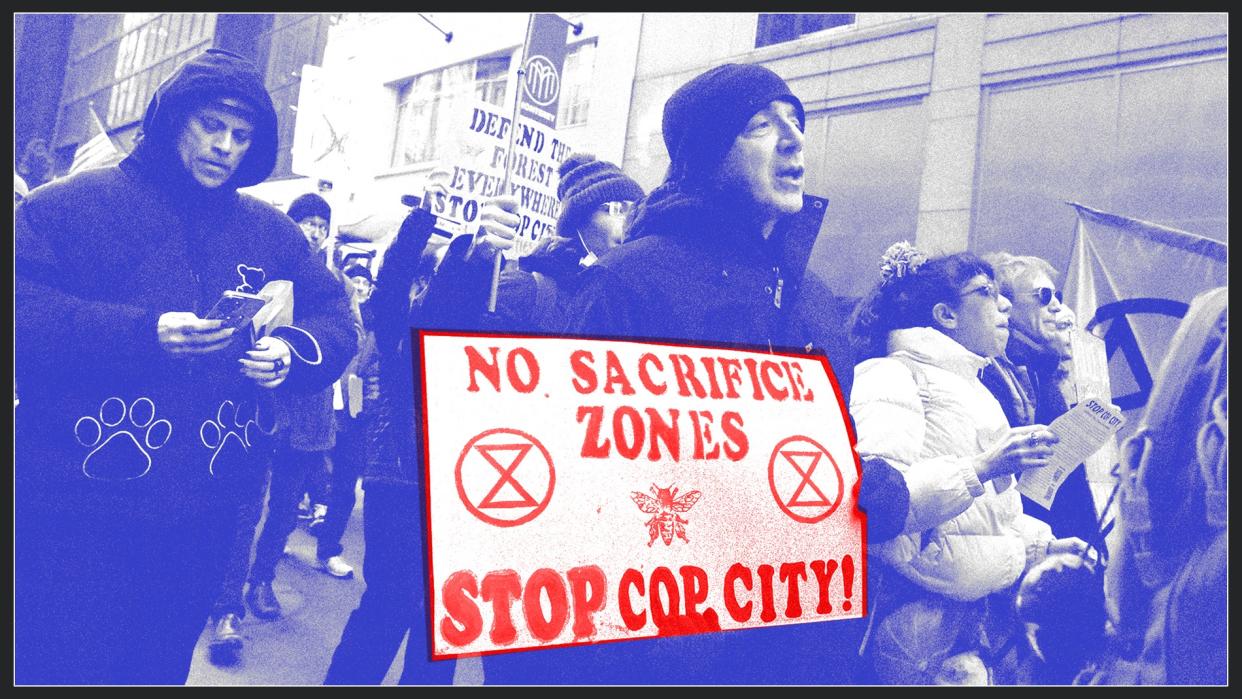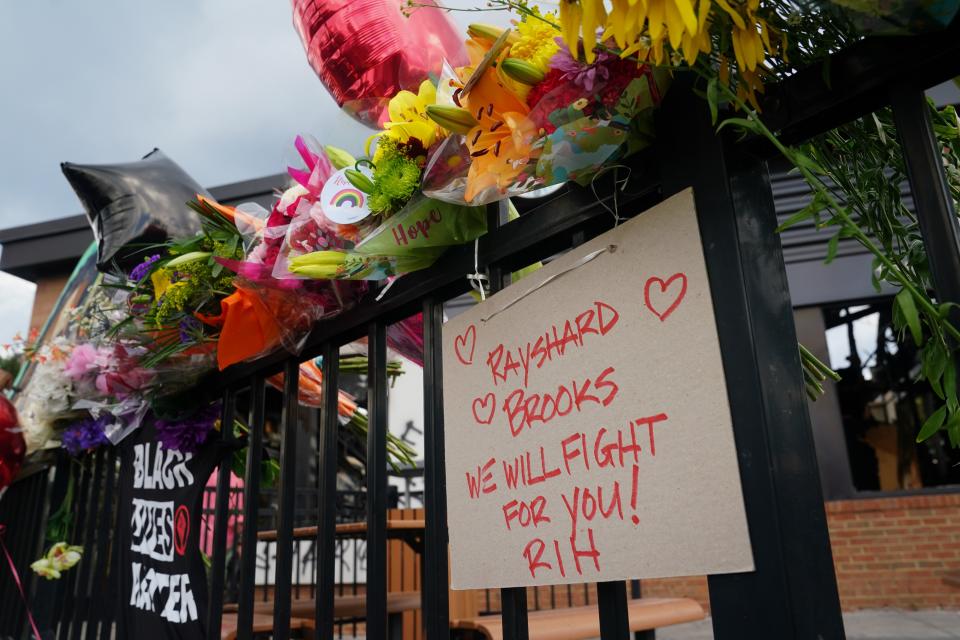Stop Cop City Protesters Are Facing Felony Charges As Atlanta Authorities Crack Down

Spencer Platt, art by Liz Coulbourn

On September 5, 2023, Georgia’s attorney general filed an indictment against more than 60 individuals involved in the Stop Cop City protests, a grassroots movement decrying the construction of a $90 million, 85-acre, military-grade police training facility in the heart of the South River Forest. Charged with violating Georgia’s Racketeer Influenced and Corrupt Organizations (RICO) Act, activists are accused of belonging to Defend the Forest, which the indictment describes as a violent “enterprise of militant anarchists, eco-activists, and community organizers.”
The South River Forest, ground zero in the battle against Cop City, is a sprawling green space known as one of Atlanta’s “lungs.” What began as a fight to stop a new police training facility from being built is now also a fight against the state’s attempt to choke a social movement and stifle dissent — which, in a democracy, is as important as breathing.
Three organizers from across the state of Georgia reflect on how the wave of repression against the Stop Cop City campaign has only deepened their commitment to the movement and their city: Eliza Fausset, a University of Georgia-Athens sophomore and cofounder of Students Against Cop City; Eva Dickerson, a Spelman College graduate and cultural worker; and Joorie, a first-generation American designer and artist, who asked us to withhold her last name to protect her anonymity. The following piece is woven together from three separate Zoom interviews.
Eliza Fausset: Atlanta is such a special place. It's really made me who I am. I'm so deeply proud to be from here. I grew up a few miles away from Martin Luther King’s house. I got a really different understanding of the world because of Atlanta, so I feel like I owe it back to this city to repay this debt.
Eva Dickerson: I was heavily active in uprisings in Atlanta from 2015 all the way through 2020. I've been an organizer here since 2015. In 2020 I was on the ground every day.
All of us in Atlanta understand this movement as a living thing that we are both experiencing and building. Cop City can never be built.
Joorie: I got into organizing because it just felt like common sense. I'm Igbo, an ethnic group [predominantly found] in Southeast Nigeria, as well as Black American. I sit in the diaspora in many ways. Being between many worlds has given me insight into what is worth fighting for and what's possible.
Atlanta was going up before 2020, and continued to go up after that summer. Atlanta never stopped going up. There have always been constant occupations and protests. I don't think Atlanta ever plans to go out.

US-SHOOTING-ENVIRONMENT-PROTEST
CHENEY ORR/Getty ImagesHistorically, state repression functions to fracture social movements and instill fear in participants and witnesses alike. One of the most famous examples is COINTELPRO, a '60s era counterintelligence collaboration between the FBI and local police to “discredit, disrupt, and destroy” radical groups like the Black Panthers and the Communist Party of the United States. The RICO indictments, and related support, illustrate the bipartisan solidarity that underlies this growing wave of contemporary political repression.
Fausset: We're against a tidal wave, a tsunami, of power.
People are being indicted for distributing flyers, and things that are not illegal criminal activity. What are they going to criminalize next? Protesting on campus?
They want us apart. They don't want collective power. And this is a way of criminalizing that. The crime is solidarity. The crime is mutual aid. The crime is care work. It's almost comical how ridiculous it is.
Dickerson: We know this repression will intensify.
The police are an occupying army, and they are prepared and equipped and enthusiastic to use whatever force it takes to get us to heed their will. That's the dark side of it. The bright side is that people want to be free — they are willing to face off against an army.
You could take the most legal action and the state will repress you, which is why everybody who signed the referendum [over the construction of Cop City, effectively] got doxxed by the city of Atlanta. This is a war, and our state fights dirty.
I wish [protester Manuel] “Tortuguita” [Terán] being slain was enough to wake people up. They were doing house raids just a few months ago, which is terrifying. The raid on our solidarity fund was intense. Cops are following people around. We have weekly food distros at different community centers around the city. They send choppers to monitor us. A lot of people who are outside the movement ask why we go by aliases. It’s because my friends' full names are in a discovery for a domestic terrorism RICO.
The state's ultimate goal is to scare us, but as the Palestinians have been telling us, as the Sudanese have been telling us, there's nothing left to lose. There's nothing left to be afraid of.
Joorie: A lot of people are indignant because they're confused about how attending a music festival can get you beaten and arrested. It's really hard to not let that fear take hold of your nervous system. [Editor’s note: Twenty-three people were arrested and charged with domestic terrorism after a March 2023 music festival in South River Forest. During that event, some activists left the festival and went to the Cop City construction site, where they broke construction equipment, set fire to a bulldozer and a police ATV, and threw rocks at retreating police officers, as the Associated Press reported. Per the AP, “None of the warrants accuses any of them of injuring anyone or vandalizing anything.”]

Environmental Activists Reoccupy Atlanta Forest
Andrew Lichtenstein/Getty ImagesThis campaign has ramifications that extend far beyond Atlanta’s city limits, say these organizers, so it is critical to raise the historic and political threads that connect the battle against Cop City to social movements across the world. In their view, solidarity must be built just as militantly as the architects of political repression build and litigate their case against it.
Fausset: A new potential member said, “Cop City is being built: What are you doing?” We always say, “Cop City is not a training center located in South DeKalb County; Cop City is the police, it's the system. It's a much larger, sustained fight.” Atlanta is the birthplace of this particular fight, but there have been plans for new cop cities across the country since the inception of Cop City.
Students Against Cop City just hosted a teach-in with Students for Justice in Palestine on the links between the Atlanta Police Department and the [Israeli Defense Forces] IDF.
Cop City is not the end; it’s the beginning, because of its national and global implications.
Dickerson: If you think this stops at Atlanta, you're a fool. If you think this stops at Palestine, you're a fool. I'm sorry we couldn't convince you.
Earth First often gets referenced in our movement. Other land-back struggles often get referenced in our movement. We often talk about the MOVE bombing in Philadelphia in this movement. We're students of history. We look directly to our Black and Indigenous ancestors for how to resist this.
Joorie: During the genocide of the Jews in Germany, Pastor Martin Niemöller said:
"First they came for the Communists
And I did not speak out
Because I was not a Communist
Then they came for the Socialists
And I did not speak out
Because I was not a Socialist
Then they came for the trade unionists
And I did not speak out
Because I was not a trade unionist
Then they came for the Jews
And I did not speak out
Because I was not a Jew
Then they came for me
And there was no one left
To speak out for me"
We are in that space right now. Resistance is common sense. Do you want to breathe air? Do you want to have food to eat? If I get a cold because I'm not taking care of myself you are likely to get a cold too. We're connected.
Many of the Stop Cop City protesters have had to pay a heavy price for their vision of Atlanta. They have had to put their bodies and livelihoods on the line for their freedom dreams. But to these organizers, the cost of not participating is too great to imagine. What is worth imagining is the version of the world that waits on the other side of their campaign.
Fausset: I want the best for my neighbors and my state and my city. Every student organizer I know operates from a place of care. We care about the humanity and safety of even the people who disagree with us. You have skin in the game too. All our lives are on the line.
Our fight is not done. They clear-cut trees, and that is horrific. We can't get those trees back, but that is not a death sentence. That’s what engines of repression do: They try to make you think the fight is over when it’s not.
Dickerson: We are adapting to the state's desire for fear by being bolder and more forward facing than ever. We have pushed our shoulders back and lifted our heads to be an example to everyone everywhere that you cannot allow them to make you afraid.
The point of this repression is to scare people, to get people to turn their backs on each other, and turn their backs on the movement. The only response to this level of organized violence is for us to raise our own levels of organization and commitment.
We're at war with the state, but the state still hasn't won. We are in a protracted struggle. We will be free. We deserve to be.
Joorie: The revolution will not be televised because it'll be boring. It'll be super mundane. People will live in the truth of understanding that our wellness is intertwined. I think about that Nina Simone quote: “I’ll tell you what freedom means to me. No fear.”
We will learn to be in relationship with all that is living in ways that are balanced and sustainable. We won’t be on this constant hamster wheel to buy things, so we will spend our time loving and caring for each other. It's so boring. That's all we're fighting to do.
In a viral clip from a 2023 Atlanta City Council meeting, when the council voted to allocate $30 million to the construction of Cop City, Dickerson addressed her beloved city in packed chambers:
“Atlanta, I love you. I believe in you so deeply… Tortuguita was a warning shot… Rayshard Brooks was a warning shot…
The State has shown us their hand, Atlanta. They have shown us what they will pay for war. What will you pay for freedom?”

US-POLICE-RACISM-SHOOTING-POLITICS
ELIJAH NOUVELAGEStay up-to-date with the politics team. Sign up for the Teen Vogue Take
Originally Appeared on Teen Vogue
More great activism coverage from Teen Vogue:


